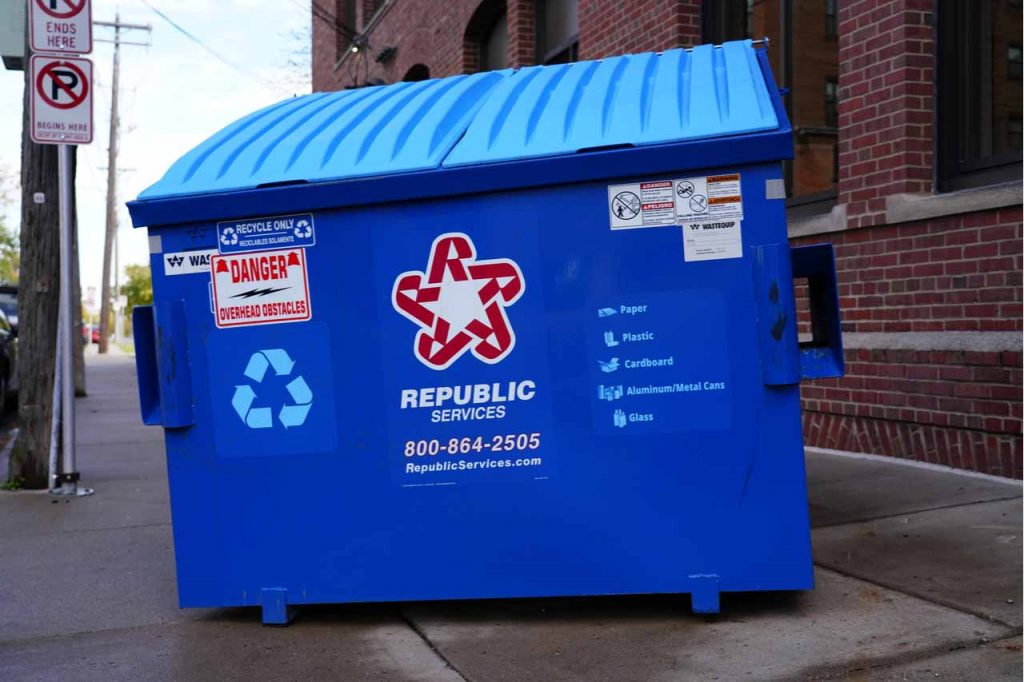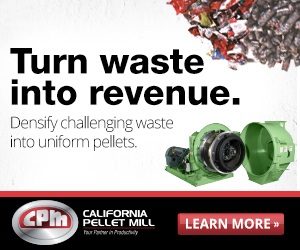
Republic forecasts servicing fewer commercial containers as bars, restaurants and schools temporarily close. | Aaron of L.A. Photography/Shutterstock
Republic Services foresees major changes in the residential and commercial recycling landscape due to the coronavirus pandemic.
In recent presentations to local governments in multiple states, Republic, the second-largest garbage and recycling hauler in North America, laid out a series of impacts the COVID-19 pandemic will have on residential and commercial materials recovery.
The predicted fallout has led Republic to stop certain collection services and to float the potential for disposal of recyclables due to processing capacity challenges. Additionally, in a report to investors, the company leaves open the possibility for higher rates levied on local programs.
Higher waste generation, higher contamination
A presentation shared with municipalities in multiple regions lays out significant disruptions and cost increases Republic anticipates.
Republic forecasts servicing fewer commercial containers, “as businesses, bars, restaurants and schools close for a period of time.” At the same time, the company predicts residential waste volumes will increase by 30% with more individuals staying home and “excess material obtained through panic purchasing.”
On the waste side of residential collection, given the additional volume, Republic expects trucks will fill faster and require more trips to the disposal site.
Meanwhile, “recycling contamination will increase as excess material from the homeowners finds its way into the recycling container,” the company stated. In messages shared with multiple communities, the company wrote that recycling contamination increased by 20% in the week prior to March 24.
Apart from the contamination challenge, Republic anticipates recycled material processing could be disrupted as some third-party processors slow down or stop operations altogether. The latter possibility could lead to recyclables being sent for disposal without a viable recycling outlet.
Taken as a whole, “this pandemic will drive uncontrollable challenges in recycling,” Republic wrote.
The residential municipal solid waste volume increase will increase costs by $2.15 per home per month, Republic estimates. And the additional contamination and potential disposal of recyclables could lead to increased disposal costs, the company wrote.
Adjusting services
To offset these costs, Republic has made a few key service changes in numerous municipalities.
In a statement to Resource Recycling, Republic said “the vast majority of our municipal partners have agreed to modify some services so we can prioritize residential solid waste collection during the COVID-19 crisis.”
According to municipal program announcements, the company is suspending residential curbside collection of yard debris and bulk materials, and in certain cases it will seek approval to dispose of recyclables due to contamination or processing capacity disruptions.
“These service changes have helped us offset some of our increased costs,” Republic told Resource Recycling. “We recognize the situation is evolving rapidly, and we are continuously evaluating the situation to help keep our employees healthy and safe while continuing to provide an essential service that is critical right now to our customers and communities across the country.”
Additionally, in many communities, Republic will only collect waste and recyclables that are bagged or placed within carts, rather than allowing excess material to be placed outside the cart.
In a March 24 update to investors, Republic noted it is “working closely with municipalities to adjust service and/or service fees to address [the] temporary increase in household waste as people spend more time at home,” the company wrote.
Some communities are already seeing the processing disruptions Republic described. In Hudson, Ohio, Republic will temporarily dispose of all materials placed in recycling carts. The city announced the change was made in response to rising residential garbage generation: Recycling carts will be used as overflow containers for garbage. Similar changes were made in Marshall, Texas and Jefferson City, Mo.
In a separate economic impact from the pandemic, Republic in the investor update reported a “favorable increase in recycled commodity prices due to slow down in recycling in China.” Bloomberg News reported many Chinese recycling centers closed due to the coronavirus pandemic, limiting the supply of domestic recyclables. Paper research firm RISI reported in late February that logistical impacts had “choked off domestic recovered paper supply,” leaving end users with significant shortages.
More stories about collection
- Colorado $10m grant fuels new MRF on state’s Western Slope
- Federal Signal paves new way with acquisition
- Interstate Waste buys North Atlantic in Connecticut



